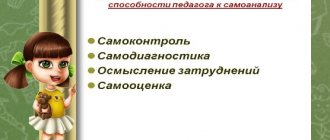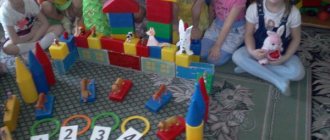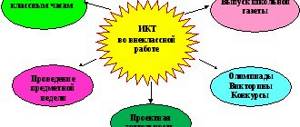The government has set difficult tasks for education to improve the quality of care and education in preschool institutions. This directly depends on the growth of professional capabilities of the teaching and educational staff of preschool educational institutions. The requirements for kindergarten employees do not end with their having a diploma from the relevant educational institutions, length of service and work experience, and completion of advanced training courses. Teachers are now required to constantly improve their professional knowledge and skills, find, test and put into practice various innovative teaching and educational methods. In order to determine how well a preschool teacher fulfills his duties, an assessment of the quality of the teacher is used.
What is the quality of professional activity and types of its assessment
The quality of a teacher’s professional activity represents the level of satisfaction of the expectations and needs of all participants in the educational process. The professional work of a teacher is assessed from several sides at once - not only by colleagues in the profession, but also by the pupils themselves and their parents, guardians, and family members.
In light of the above, an assessment of a teacher’s professional activity can be of the following types:
- Internal. It is carried out by the leadership of the preschool educational institution (head and senior teacher, methodologist) and the most qualified teachers of the children's educational institution.
- External. It is carried out by members of the parent committee, the public and representatives of the education department.
The personality of the teacher and educator is of great importance in the development of each child. Therefore, it needs to correspond to the actively developing pedagogical science and meet the following qualities:
- Understanding of modern educational and pedagogical tasks facing preschool educational institutions.
- A reverent attitude towards the personality of each child.
- Humane attitude towards children and adults, empathy.
- Preservation and strengthening of the physical and mental health of pupils.
- Caring for the development of the individuality of each student.
- Creation and continuous enrichment of the cultural-informational and subject-development environment in the group of one’s preschool educational institution.
- The ability to use and rethink, improve and implement advanced pedagogical technologies and methods into practice.
- The ability to carry out experimental activities to introduce new methods of education and training into practical application.
- Self-education and self-education of the teacher’s personality in the light of the requirements of modern pedagogy.
To conduct an internal assessment of the quality of work of teachers in a children's educational institution, the following functions are most often performed:
- Monitoring the continuous improvement of the level of self-education of teachers and educators of preschool educational institutions.
- A teacher’s portfolio can be considered as a way to determine the effectiveness of his professional activity.
- Compiling ratings of caregivers based on assessments of activity screens.
- Conducting a psychological and pedagogical assessment through testing and questionnaires.
- Certification of educational and teaching staff. It is a powerful incentive to improve the level of professional qualifications, competence and pedagogical improvement of preschool teachers.
Diagnostics and assessment of the results of preschool educational institutions
Modern scientific, methodological and technological approaches in diagnosing and assessing the results of activities of preschool education organizations
Modern education is focused on achieving high quality, accessibility, continuity, increasing its innovative and creative role, as well as its focus not so much on the assimilation by preschoolers of a certain amount of knowledge, but on the development of the creative abilities of the individual, the desire to learn, explore, cognize, and bear responsibility for accepted their decisions.
Reform of the education system should be based on forecasting and monitoring its quality. Monitoring quality is necessary for educational institutions to maintain the core values of education. The analysis shows that it is impossible to borrow someone else’s quality assessment system, just as it is impossible to take the concept of another educational institution in ready-made form. It is necessary to develop your own system, to formulate the features of the quality of education in a preschool institution. In practice, a situation often occurs when the very concept of quality of education has not yet become the personal meaning of teaching staff, the measure of all changes and achievements in education. A comprehensive study of various parameters for assessing management activities is reflected in the theory of social management and foreign management (M. Albert, I.V. Bizyukova, P.F. Drucker, L.I. Menshikov, M.H. Meskon, A.M. Omarov, G.H. Popov, F.A. Taylor, F. Khedouri, etc.); in management of pedagogical systems (E.S. Bereznyak, T.M. Davydenko, V.I. Zvereva, M.I. Kondakov, V.S. Lazarev, A.A. Orlov, M.M. Potashnik, V.S. Pikelnaya, E.P. Tonkonogaya, P.I. Tretyakov, P.V. Khudominsky, PX Shakurov, etc.). The works of K.Yu. are devoted to certain aspects of the management activities of preschool educational institutions leaders. Beloy, A.K. Bondarenko, E.Yu. Demurova, T.S. Komarova, L.V. Pozdnyak, R.Ya Spruzha, A.N. Troyan and others. They substantiate the requirements for a leader and highlight the main directions of his activities. Of particular interest are the studies of Yu.A. Konarzhevsky, E.V. Litvinenko, V.G. Molchanova, G.M. Tyulyu, T.I. Shamova, in which versions of programs for assessing the managerial activity of a leader in the education system were developed, while no special research was conducted on the issue of assessing the managerial activity of a head of a preschool educational institution. S. F. Bagautdinova, G. Sh. Rubin, N. G. Korneshchuk, A. N. Starkov, taking into account the task of systemic development of preschool education, to evaluate the results, they select an integrative characteristic of the child’s readiness for school (physical, intellectual, personal), supplementing its socially significant indicators of the institution’s activities (morbidity rate, performance indicators of preschool educational institutions, demand for preschool educational institutions among the population). However, a number of scientists are critical of the appropriateness of such an indicator. Thus, T.I. Erofeeva believes that forced, targeted special preparation for school gives rise to a lack of motivation to learn, neuroses, loss of independence and creative activity, and deterioration in children’s health. The introduction of standards “tailored to the school” can seriously change, in her opinion, the status of preschool education (M. S. Aromshtam, A. K. Belolutskaya, E. V. Ovchinnikova). The main directions for ensuring a comprehensive assessment of the quality of professional activities of teachers as an open educational system are based on the conceptual provisions of A.I. Ostroukhova, Medvednikova. Problem. An analysis of practical materials in educational authorities also showed the lack of a clearly thought-out system of scientifically based criteria and tools for assessing the management activities of managers. Today, when solving the problem of the quality of education, two directions can be traced that take the assessment of educational systems to a fundamentally new level. The first direction is associated with the development of quantitative analysis based on data from state mandatory statistical observation, external assessment of educational achievements, and processing of the results of sociological research. This allows us to move from judgments and opinions to a reasonable comparative analysis and forecast to identify the dependencies of various factors influencing the effectiveness of educational systems. The second direction is based on shifting priorities in assessing education from process to result. The variability of educational programs and the emergence of new educational technologies have indicated that similar results in the functioning of educational services can be achieved in different ways, which are largely determined by its individual characteristics. In this regard, the problem of measuring the quality of education arises due to the fact that: - the quality of education must be assessed to ensure the guarantee of human rights to receive an education that corresponds to the world level; — the quality of education should be a measure of all the achievements of a preschool institution and changes made to educational policy and practice, therefore it is necessary to be able to evaluate it; — quality assessment is necessary, first of all, to comprehend and formulate development goals, create models of new practices, and not only to make management decisions aimed at ensuring the functioning of educational institutions; — the system itself of tracking and constant quality measurement (quality monitoring) is valuable. Self-analysis of activities at all levels is valuable in that it allows you to determine where the preschool is today in comparison with others in order to remain competitive. Based on the above, we can conclude that there is a contradiction between the need to improve the quality of management of preschool institutions and the lack of a scientific approach to assessing the management activities of the head of a preschool educational institution. So, many authors associate quality assessment with the characteristics of the educational process and its results, while the existing practice of assessment during the certification of preschool educational institutions is focused primarily on assessing the conditions of educational activity. The concept of “quality of the educational process” is multifaceted. From the point of view of children, this is learning in an interesting, fun way for them; from the point of view of parents, this is the effective education of their children in programs that preserve children’s health (both mental and physical), maintain children’s interest and desire to learn, provide opportunities for admission and school, etc.; from the point of view of educators, this is, on the one hand, a positive assessment of their activities by the head of the preschool educational institution and parents, on the other hand, the successful learning results, health and individual progress of their pupils; from the point of view of the head of the preschool educational institution, this is: firstly, the effectiveness of the activities of educators and the preschool educational institution as an organizational structure; secondly, high assessment of the activities of educators and preschool educational institutions by parents and children; thirdly, successful learning outcomes, health and individual progress of preschool students; fourthly, high assessment of the activities of the head and the preschool educational institution from the governing bodies of education; from the point of view of a micro- or macro-level manager, this is the efficiency of functioning and increasing the viability of the managed subsystem. Analysis of different approaches to quality assessment gives grounds to assert that performance indicators should be quantitatively limited, verifiable and allow one to establish the child’s progress in his development throughout preschool childhood. In turn, the Comprehensive Assessment Model should include a balanced combination of normative-oriented, content-target, organizational-technological, motivational-personal, control-diagnostic and correctional-analytical components, taking into account which criteria and indicators are determined. The criterion of comprehensive assessment is understood as a sign of the degree of compliance of the quality of a teacher’s professional activity with established norms, requirements, benchmarks, and standards. An indicator is a quantitative and qualitative characteristic of a teacher’s professional activity, which is the result of measurement. The basis for developing a unified strategy and managing the assessment of the quality of education is the design of various types of monitoring (informational, basic, managerial and complex) and its main stages, which are developed in joint activities at special meetings of pedagogical workshops. Monitoring studies are carried out to assess the quality of education: the quality of goals, conditions, processes, results (subject, meta-subject, personal results, values, health of all participants in the educational process). Of particular interest is pedagogical monitoring, including: monitoring the effectiveness of the educational process; innovation processes (innovation, research, experimental activities); personality development of children and teachers; success of the exercise; quality of mastering the components of education; formation of types and skills of pedagogical activity; creative level of children and teachers. Educational qualimetry (Integrated assessment technology), the main provisions of which are: consideration of the quality of activities of a preschool educational institution as a unified system of elements, their properties and characteristics, the functioning and development of which is natural, from the standpoint of a systems approach, educational qualimetry, quality theory; ensuring the objectivity of the assessment results of a preschool educational institution by determining the value preferences of the subject of assessment in the light of the social order of society for education; consideration of the object of assessment according to an integral set of indicators, which makes it possible to take into account the entire complex of indicators, all the diversity of the activities of a preschool institution, which is ensured by aggregating quality indicators of the activities of a preschool educational institution into a single comprehensive quantitative assessment. The process of quality assessment in qualimetry, which represents the following sequence of actions: • determining the goals of assessing an object; • disclosure of the structural quality of the object; • determination of the nomenclature of interrelated indicators of the quality of an object, as well as statistical characteristics of indicators (statuses and weight); • determination of the values of object quality indicators; • assessment of the quality of the object; • collapsing quality indicator assessments into a single comprehensive assessment; • analysis of the results obtained. To carry out an objective assessment of the quality of teachers’ professional activities, a set of methods has been selected for each indicator: study of documents, analysis of teaching activities, observation, questioning, testing, conversation, expert assessment, self-assessment, introspection; pedagogical diagnostics, monitoring, control (operational, current, preventive, cross-sectional, thematic, effective), certification, methods of statistical data processing. As an example, Appendices 1–2 respectively present the questionnaires “Parents’ satisfaction with the activities of teaching and management staff of preschool educational institutions” and “Identification of factors that stimulate and hinder the development of teachers.” One of the stages of the quality assessment process, in accordance with the requirements of educational qualimetry, is the development of a nomenclature of quality indicators, in accordance with the structure presented in Diagram 1. The main structural component among the criteria for a comprehensive assessment is the methodological work of a preschool institution. Methodological work significantly influences the quality and efficiency of training and education, the final results of the work of a preschool institution, therefore it is quite legitimate to consider it as an important factor in the management of a modern preschool educational institution. The main criteria for the optimality of the final results of methodological work in preschool educational institutions are: 1. performance criterion; is achieved if the results of education, upbringing and development of pupils increase to the optimal level (or approach it) within the allotted time without overload; 2. criteria for rational expenditure of time, cost-effectiveness of methodological work; is achieved where the improvement of teachers’ skills in order to optimize training and education takes place with a reasonable investment of time and effort by teachers on methodological work and self-education, in any case, without overloading teachers with these types of activities. The presence of this criterion stimulates a scientific, optimization approach to the organization of methodological work; 3. criterion for increasing teachers’ satisfaction with their work; can be considered achieved if there is an improvement in the psychological microclimate in the team, an increase in the creative activity of teachers, and teachers’ satisfaction with the process and the results of their work. The problem of assessing the quality of the professional activity of a preschool teacher The content of a comprehensive assessment of the quality of the professional activity of teachers includes working instructions and evaluation and measurement materials: planning analysis schemes, normative and documentary support, direct educational activities, regime moments, other activities of the educational process, assessment sheets, maps, etc. including those developed by L.M. Denyakina, M.V. Korepanova, I.A. Lipchanskaya. To carry out an objective assessment of the quality of teachers’ professional activities using the above schemes, work instructions were developed to help experts. Let's consider the methodology for this assessment. For example, the values of indicators 1.1–1.5 used in the calculation according to criterion 1 are determined using an ordinal measurement scale (from 1 to 5 points). It establishes ordinal relationships of preference and allows one to judge the “better-worse” relationships between compared objects based on the measured quality. The ordinal scale in this methodology is a series of numbers that correspond to a certain degree of expression of the assessed professional activity of teachers, its quality in relation to a preschool educational institution. Several ratings (from 1 to 5 points) characterize the degree of expression of the quality of the assessed characteristic. The expert selects assessments that best correspond to the quality of the teacher’s professional activity, while having an intermediate scale between qualitative and quantitative. Processing and analysis of the summarized point estimates are carried out on the basis of mathematical statistics methods with the derivation of the average score for each of the six criteria according to the formula: S (k) = B (p) + B (p) + ... + B (p), K (p) where B (p) – score for the indicator; K (p) – number of indicators; S (k) – average score according to the criterion. Each indicator in this methodology consists of two parts: meaningful and evaluative. The content part includes a qualitative characteristic of the teacher’s professional activity, the evaluation part includes a rating scale on a five-point system, which allows the most objective assessment of a specialist for each indicator: • 4–5 points – the teacher’s professional activity fully reflects the qualitative characteristic, is clearly expressed and stable; • 3–4 points – the teacher’s professional activity mainly reflects this characteristic and manifests itself quite consistently, the teacher strives to achieve quality; • 2–3 points – this characteristic manifests itself in the teacher’s professional activity unstable, but within the acceptable norm, the teacher has not perfectly mastered theoretical knowledge and methods of using it in practice; • 1–2 points – the characteristics of professional activity according to this indicator are not expressed sufficiently, they manifest themselves unstable, the level of teacher development is on the verge of critical. When determining the final average score, their maximum number (or maximum sum?) can reach 30. The level of professionalism of the teacher is determined based on the following gradation. A low level is indicated by a score of 15–20 points. At this reproductive (technological) stage there is a so-called teacher-performer. It is characterized by the absence of the need for independent assessment of professional activity, adherence to stereotypes, methodological recommendations without taking into account changing conditions, the characteristics of students, the needs of their parents, the social order of society, and a focus on reproductive forms of the educational process. 20–25 points – constructive (heuristic) level – indicate that the teacher is a student-oriented practitioner. This means that he has independent judgments, but with insufficient evidence-based argumentation; he uses analytical skills, diagnostic methods, and modern means of education and training in his work. The middle -level teacher in most cases implements a differentiated approach to children, takes into account the needs of their parents, coordinates his professional activity in accordance with the social order of society. A DOW employee, who received from 25 to 30 points, is at a high research (creative) level. The teacher-master is a competent researcher who consciously chooses innovative methods, forms and means of the educational process, independently develops pedagogical technologies and methods, owns evidence-based scientific argumentation, adheres to his own pedagogical principles and implements them in practice. In addition, he predicts the development of pupils taking into account their individual and age -related features, carries out the pedagogical education of their parents, based on the available needs, and also performs their work in close interaction and cooperation with representatives of social institutions. A set of indicators that determines the level of professional activities of teachers: • advanced training, professional retraining; • knowledge of the regulatory framework, theoretical and practical foundations of professional activity; • knowledge and use of information and communication technologies in the process of educational work; • participation in problem-research, experimental activities; • results of work to reduce the incidence of children; • results of work to increase the interest of visiting the DOW by pupils; • level of development of the general educational program of the DOW; • ensuring the safe conditions for children in the preschool educational institution; • quality of organization of the developing environment of the group; • results of the participation of pupils in events of various levels; • a teacher's rating among parents; • the presence of generalized pedagogical experience; • the presence of scientific and methodological materials; • participation in scientific and practical conferences, pedagogical readings, in the work of the Moscow State Pedagogical University, sections, • pedagogical councils; • conducting open classes, master classes; • Professional activity of the teacher: the leadership of the MO, a creative group; participation in organizing committees, jury of competitions, certification commissions; support for the pedagogical practice of students; • participation in professional competitions; • encouragement of the teacher in the intertestation period. Such personal and professional qualities and competencies of the educator come to the fore: • a clear vision of modern tasks of preschool education; • value attitude towards a child, culture, creativity; • humane pedagogical position; • the ability to take care of the ecology of childhood, preserving the spiritual and physical health of children; • manifestation of concern for the development of the individuality of each child; • the ability to create and constantly enrich the cultural-informational and subject-developmental educational environment; • the ability to work with the content of learning and a variety of pedagogical technologies, giving them a personality-semantic orientation; • the ability to carry out experimental activities to introduce subjectively and objectively new approaches and technologies, evaluate their compliance with the objectives of education accepted at the state level, the objectives of the humanization of the educational process, the capabilities and needs of children; • The ability to self -education, self -exposing the personal structures of consciousness, giving the humble meaning of the teacher's activity. Thus, the regulatory requirements for professional activity, which are reflected in the qualification characteristic of the teacher and include basic knowledge, skills, are supplemented by indicators that reflect the ability to use Zun, comprehend professional experience, achieve the result. In accordance with this trend, such constructs as competencies, competencies and metaporfessional qualities are introduced into the content of vocational education and the methodology for evaluating professional activities. So, a comprehensive assessment of the quality of professional activities of teachers of a preschool educational institution provides for a number of components: relevant methods; components and stages of assessment; The nature of their connections with each other and with all activities. The use of a comprehensive assessment model helps the teacher to identify existing problems, stimulates him to improve the quality of his own professional activity and the level of professionalism. A set of corrective actions and measures based on the results of assessing the quality of professional activities of teachers allows you to get the final result for which this model has developed (achievement, maintaining and improving the quality of professional activities of teachers, satisfying the needs and expectations of participants in the educational process). The presented materials do not claim to be completely covered by all aspects of the considered problem, but give an impulse to further study the issues of assessing the quality of professional activities of teachers of a preschool educational institution. The relationship of these issues with the solution of the problem of assessment subjects indicates the relevance of the further theoretical and empirical study of the topic of a comprehensive assessment of the quality of professional activities of teachers. As the main guidelines that determine the quality of modern preschool education are the following: satisfying the needs of the family and the child in the services of a preschool educational institution; the well -being of the child in kindergarten; preservation and necessary correction of his health; The choice of the institution of the educational program and its scientific and methodological support. Thus, the hierarchical structure of the quality of the DOW activity, in accordance with the main functions, can be represented as follows: 1. Protection of life and strengthening the health of children;
2. development of children; 2.1. Physical development; 2.2. Cognitive-speech; 2.3. Socio-personal; 2.4. Artistic and aesthetic; 3. Interaction with the family. The degree of achievement of the goal is evaluated through the degree of implementation of the main functions of the DOW. Appendix No. 1
Model for a comprehensive assessment of the quality of professional activity of teaching staff of preschool educational institutions L.F.
Medvednikova, Ph.D. ped. Sciences Purpose: Comprehensive assessment of the quality of professional activity, determination of the level of professionalism Types of comprehensive assessment: • internal;
• external Components of a comprehensive assessment: • normative-oriented; • content-targeted; • organizational and technological; • motivational and personal; • control and diagnostic; • correctional and analytical Criteria: • implementation of regulatory and documentation support; • compliance of the content of the educational process with the goals of preschool education; • creation of a subject-development environment; • business and personal qualities of a teacher, motivation for teaching activities; • effectiveness of the educational process; • correction of teaching activities Methods: • study of documents; • analysis; • self-esteem, self-analysis; • monitoring; • testing; • survey; • conversation; • observation; • control; • examination; • certification Levels of professionalism: • reproductive (technological); • constructive (heuristic); • research (creative) Results: • Achieving, maintaining and improving the quality of professional activities of teaching staff. • Satisfying the needs and expectations of all participants in the educational process Appendix 2
Indicators of a comprehensive assessment of the quality of professional activities of teaching staff of preschool educational institutions 1. Fulfillment of the requirements of legislative acts and regulatory documents of preschool education. 2. Application in practice of the provisions of preschool pedagogy, psychology and pediatrics. 3. Compliance with instructions on labor protection, safety precautions, protection of life and health of students. 4. Teachers’ record-keeping culture. 5. Satisfying the educational needs of children, parents, and society. 6. The amount of pedagogical knowledge that meets and (or) exceeds the requirements of preschool education. 7. Implementation of modern educational programs and methods of preschool education. 8. The effectiveness of pedagogical techniques and technologies for the education and training of preschool children. 9. Use of information technology. 10. A comprehensive system for planning educational activities, routes for individual development of students. 11. Compliance of the content of educational activities with the requirements of educational programs of preschool education. 12. Use of innovative methods, means and forms of preschool education. 13. Creation of a modern, aesthetically attractive subject-development environment. 14. Compliance with sanitary and hygienic standards for the care of preschool children. 15. Providing a favorable microclimate and psychological comfort in the children's team. 16. Participation in creative, experimental work on the problems of preschool education. 17. Implementation of self-education and self-education. 18. Professional competence in matters of education and training of preschool children. 19. Discipline and responsibility. 20. Implementation of educational programs for preschool education in full. 21. Achievements of participants in the educational process (competitions, exhibitions). 22. Diagnostics of development (knowledge, abilities, skills) of pupils. 23. Coordination of the educational process, its compliance with the requirements of preschool education. 24. Interaction with social institutions on issues of preschool education. 25. Pedagogical education of parents of pupils.
We recommend watching:
The relationship between the development of a teacher’s professional skills and the success of a child’s personality The relationship between the development of a teacher’s professional skills and the success of a child’s personality Organized educational activities with preschool children Network and interdepartmental interaction between the school and the Children’s Art Center
Similar articles:
Perspective-thematic planning in kindergarten
Criteria for assessing the quality of a teacher’s work
To determine the level of professional activity of a teacher, special assessment criteria are used, including the following points:
- The effectiveness of the teacher’s activities, manifested in the achievements of children from his group. It includes the following:
- Personal achievements of pupils, which are characterized by higher performance compared to the previous period.
- Preservation and strengthening of the physical and mental health of pupils.
- Absence or reduction of missed classes, low morbidity rate in the group.
- Development of creative abilities of pupils.
- Teacher self-education:
- Participation in the methodological activities of preschool educational institutions.
- Generalization and presentation of your teaching experience.
- Publications in scientific, professional and other publications.
- Participation in competitions at various levels.
- Stable management and high quality of documentation.
- Innovation activities:
- Development and implementation of creative or social projects, proprietary programs, technologies, methods that help improve the quality of work of a preschool institution.
- Development and implementation of innovative programs.
- Effective organization of a safe subject-development environment in a group.
- Interaction with parents and guardians of pupils.
Assessment of the quality of professional activity of a senior preschool teacher is carried out according to the following criteria:
- The effectiveness of the methodologist:
- Achievement of higher levels of professionalism by preschool teachers compared to the previous assessment period.
- A variety of forms of methodological work to improve the professional qualifications of the educational and teaching staff of preschool educational institutions.
- Comprehensive development of teachers’ creative abilities.
- Self-organization and self-education:
- Effective participation in the methodological work of a preschool institution.
- Generalization and presentation of experience.
- Publications.
- Participation in competitions.
- Timeliness and quality of documentation:
- Innovative activity of a teacher.
- Development and implementation of various projects together with specialized preschool education specialists.
- Mastering and implementing federal state requirements in preschool educational institutions.
- Effective organization of a subject-development environment in the methodological classroom.
- Organization of interaction and variety of forms of work with parents.
The criteria for assessing the teaching and educational activities of kindergarten employees not only influence their perception as successful specialists, but also affect the level of remuneration. During certification, teachers and educators with a high level of professional assessment have a greater chance of receiving higher qualifications, and this means a significant increase in salary.




